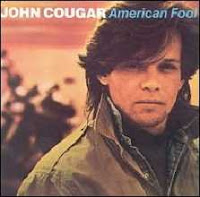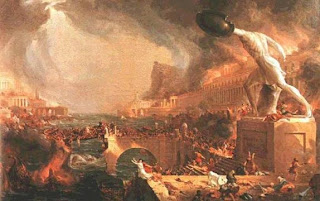
Today marks the first day of 2009 as well as the first day of the month of January. The old year has ended, the New Year is begun. It is a time of endings and beginnings.
The early Romans venerated a deity named Janus. Janus was a sky-god, ancient even to the Romans. Ovid described Janus as both primordial Chaos itself and the first deity personified when the discord of Chaos led to creation of the universe. Thus, Janus was associated with beginnings and endings, especially as symbolized by doors and gates. The Romans believed Janus opened the gates of heaven each dawn to let out the morning and then closed them at dusk to end each day. In the first role, Janus is called Patulcius "the opener". In the second role, Janus was Clusius "the closer". These roles also figure in the original office of "janitor" (ianitor in Latin) or "doorkeeper". (Note that even to the present day a janitor is often the custodian of many keys...)

Janus was the doorkeeper, the opener and the closer, indeed he was the door, the gateway, the passage itself. As each ending is also a beginning and vice-versa, Janus was represented as having two faces, with the ability to see both forwards and backwards, into the past and into the future, through both sides of “the door”. Thus, I find it very appropriate that January is named after Janus. However, January was not always the first month of the year.

The ancient Roman calendar had ten months beginning with March (Martius) and ending with December (Decembris, literally the "tenth month"). The winter period after Decembris and prior to Martius was not marked by months. The legendary Numa Pompilius, second king of Rome after Romulus, allegedly added the months of Januarius and Februaris. Plutarch wrote that Numa Pompilius also changed the beginning of the year to January rather than March (Martius) because Pompilius emphasized peace over war (Martius being named in honor of Mars the god of war).
Tradition and the idiosyncrasies of inter-calendary periods proved too challenging to the calendar of Numa Pompilius. By the time of Julius Caesar this calendar had become quite confused. Thus, Julius Caesar finally fixed the first day of the year as January 1 in 45 BC and aligned it with the “tropical year” in what became known as the Julian calendar. The Julian calendar stayed in effect until the sixteenth century when Pope Gregory XIII instituted the current calendar system. Even calendar systems have beginnings and endings.
So what endings and beginnings do we celebrate on this New Year's Day? For one, it is an ending and a new beginning for this blog. Vociferatu is now in its third incarnation. The previous two attempts were failures, quite frankly. Starting anew on January 1st is highly symbolic for me and I hope it proves auspicious.
This month will also see the end of one presidency and the beginning of another here in the United States. One face of Janus looks back over the tenure of President Bush. The other peers into the future of President-elect Obama. I ask for well wishes and blessings upon both. One has served his country and another will soon begin to serve.
Many have laid our current woes as a nation at the feet of President Bush. He has become the "scapegoat" in its ancient sense. It is unfair, but then life is full of unfairness. As with every President, indeed with every person in each role they perform, President Bush has had failures and mistakes. According to my fellow citizens, President Bush has either been the worst president ever or a great president sorely misunderstood. More likely, his performance lies somewhere between those polarized views.

Personally, I think President Bush is a decent man who rose to the occasion in the aftermath of the September 11th terror attacks and then became too entrenched in the "with us or against us" viewpoint. Still, I thank him for his leadership, his strength in the face of adversity, his service, and his accomplishments. In the perspective of history, I believe President Bush will be seen more kindly than his current political opponents would acknowledge.

Mr. Obama will soon end his role as candidate to undertake the office of President of the United States of America. It is a daunting task in itself, but Mr. Obama also bears the burden of being the first President "of color" in our history. And these are difficult times with economic challenges at every turn, an unpopular military role in Iraq, and political corruption dogging his steps even before his inauguration. My political views do not frequently fall into line with President-elect Obama, but for his sake and ours, I wish him well and give him my support.
Endings and beginnings. Calendars and the marking of time. Does the ever-present “now” hide the fact the each instant is a passage from the past into the future? Keep Janus in mind and look both forwards and backwards, seeking wisdom from the past to guide you into the future. We are our own doorkeepers. Be careful what doors you open...and what doors you close.
Best wishes to everyone...may you have a wonderful, rewarding, satisfying 2009.














